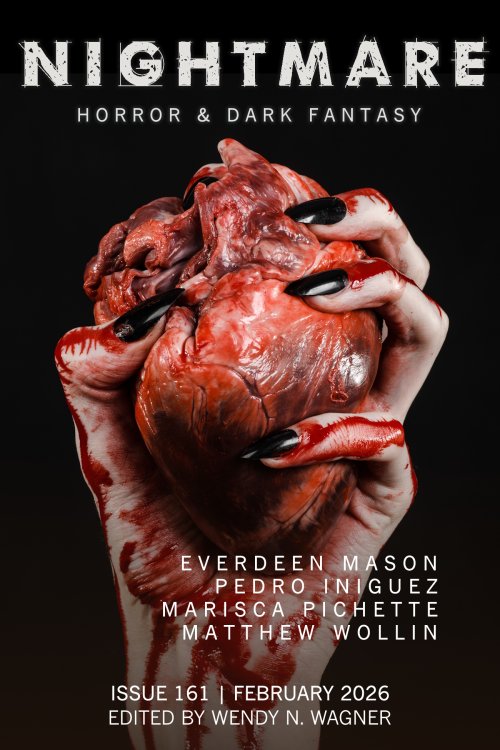Herman Melville’s “Bartleby, the Scrivener,” (bit.ly/3PIvslrgutenberg) first published in 1853, is not typically considered a work of horror. The tale of a law clerk who absents himself from his duties at work, then from the outside world, then from life itself, it presents itself as a work of realism with no gore, no horror, terror, nothing of the supernatural or the monstrous about it. But what if we read it as a progenitor of weird fiction, particularly of a subtle, understated sort that focuses on alienation, dehumanization, and the anxieties of modernism? If we take “weird fiction” to refer to horror that focuses on dreadful unsettlement, “Bartleby” is a prime early wellspring, an initial example in a genealogy of the weird that begins not with Lovecraft or Poe but with Melville.
Throughout the story, Melville uses the language of weird fiction—of unease, death, and unsettlement, to describe Bartleby. He first appears to the elderly narrator of the story, a lawyer who employs him, as “motionless . . . incurably forlorn.” Melville uses the word “cadaverous” to describe him on three separate occasions and “pallid[ly]” an astounding six. In the copying work that Bartleby initially consents to, he writes “silently, palely, mechanically.” There is nothing “ordinarily human” about him, a “strange creature,” an “intolerable incubus,” a being of “morbid moodiness” who “occasioned [the narrator’s] uneasiness.” There’s something, indeed, of the numinous about him, a fascination on the part of the narrator “that not only strangely disarmed me, but, in a wonderful manner, touched and disconcerted me.” When the narrator, unable to compel Bartleby to leave his offices, resorts instead to abandoning them and relocating his practice, Bartleby remains, explicitly haunting the premises.
Bartleby is, in other words, in his own realist(ish) way, a locus of irruption, of weirdness crowding into the world and unsettling things. His insistent refrain “I would prefer not to” becomes infectious, an early example of the weird horror commonplace of memetic, awful knowledge or language. The narrator himself “somehow . . . got into the way of involuntarily using the word ‘prefer’ upon all sorts of not exactly suitable occasions” and worries about further “aberration,” which indeed strikes as the other clerks fall prey to this linguistic fixation.
The other weird fiction commonplace working through the story is the rather Gnostic idea of a veil occluding a real, deeper world from the one we can see—think of Arthur Machen’s “There is a real world, but it is beyond this glamour and this vision . . . I do not know whether any human being has ever lifted that veil . . . the ancients knew what lifting the veil means. They called it seeing the god Pan.” This plays metaphorically through Melville’s earlier story, which pays especial attention to both the exterior windows of the office and, inside, a screen occluding Bartleby from his colleagues. Outside of the office the “windows commanded an unobstructed view of a lofty brick wall, black by age and everlasting shade;” looking into a gap between Wall Street buildings which “not a little resembled a huge square cistern”—a space, in other words, that brought to mind a vital source of water and life, but which was notably empty and useless.
Another window, under which sits Bartleby’s desk, previously looked out on “a lateral view of certain grimy back-yards and bricks, but which, owing to subsequent erections, commanded at present no view at all.” This symbolic view of Wall Street, the heart of capitalism, haunts Bartleby, the ur-alienated-subject of capitalism, even as he haunts the office, as “for long periods he would stand looking out, at his pale window behind the screen, upon the dead brick wall.” The screen obscuring Bartleby is paralleled with his own fixation on the dead brick of Wall Street, the anxious nothingness of alienated labor under capitalism: it is, after all, subtitled “A Story of Wall Street.” There’s a hint here again of dreadful shared knowledge, as the narrator interrupts Bartleby’s “dead-wall reveries” to ask if his employee will do no more work. Bartleby indeed would prefer not to, and when pressed for a reason indifferently and ominously replies, “do you not see the reason for yourself?”
What, from a generic perspective, are we to make of the story’s all-encompassing but object-less dread and anxiety, this unstated and unseen reason? Stephen King, in Danse Macabre, riffed on Ann Radcliffe in distinguishing between the three affects of horror: “terror on top, horror below it, and lowest of all, the gag reflex of revulsion.” Following that schema, what if we add an affect above, furthest removed from physical recoil of disgust? As opposed to the buildup that King presents—terror when the hint of menace appears, horror when the menace jumps out into full view, revulsion when the menace is gorily feasting on its victims—what if there’s never anything specific to behold? What if the unsettling aspect of the story suffuses the world at large? (A problem for another day is disentangling this idea of anxious unsettlement from the Freudian baggage of the uncanny.) This all-encompassing unsettlement allows the author to maintain a sense of abstraction and mystery, which the clarity of horror and revulsion often dissipates.
This root impossibility of knowing or understanding makes weird fiction the fiction of epistemological collapse. It’s what best captures the anxiety of living in an unknowable and alienating world. This, it seems to me, is what lies at the heart of weird fiction, not its oft-cited generic melting-pot—plenty of fiction throws together aliens, ghosts, and magic. It’s weird fiction that then uses those generic markers to remind its readers of the alienation, anomie, and anxiety of the world. On the occasion of the publication of the VanderMeers’ monumental anthology The Weird, which engaged in a retrospective, wide-ranging genre/canon formation to which I am very much indebted here, contributor K.J. Bishop suggested that the “weird” in weird fiction is “the sense of being reminded that ordinary life floats along on a current of mystery with a gaping question mark at the end” (bit.ly/3PBg2zj).
“Bartleby” ends with the narrator’s horrified realization that it might have been Bartleby’s previous employment in the national dead letters office that undid the copyist. “Dead letters! does it not sound like dead men? . . . On errands of life, these letters speed to death.” Bartleby, aware of the emptiness and alienation of the modern world, removes himself, preferring-not-to to such a degree that he wastes away physically following his spiritual death.
Bartleby’s refusal rises to the level of metatext in weird fiction. As Michael Cisco diagnoses it, the alienated strain of weird fiction “amounts to a resistance to the ominously hollow, obviously false and palliative optimism that characterizes popular culture now.” This is paralleled by Slavoj Žižek’s infamous parroting of Bartleby in the context of Occupy Wall Street and after, “I would prefer not to” ported to the twenty-first century refusal of the gig economy, precarity and growing inequality. The fictional Bartleby exerted control over the anxiety of living in the world the only way he could—by refusing. For readers of Bartleby and writers following Melville, this approach to weird fiction gives depth and comprehension to the anxiety of living in an unknowable universe.
Weird fiction isn’t the endurance test of extreme horror, perhaps, but it certainly also isn’t cozy and reassuring—it is the literature of unsettlement and estrangement. To come at this from another angle, Thomas Ligotti once said, “If you read a lot of horror literature because you like to be scared, then you’re probably a normal, healthy person. If you read horror literature to fulfill some deeply personal predisposition, be assured there is something odd and unwholesome about you. Don’t ever let anyone tell you it’s not alright to be that way.” “Bartleby, the Scrivener” is a prime example of this kind of fiction, weird or horrific, that fulfills the deeply anxious predispositions with which we greet the world.









